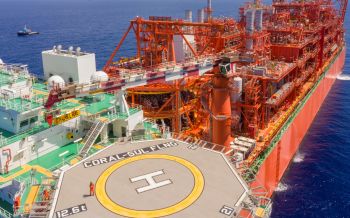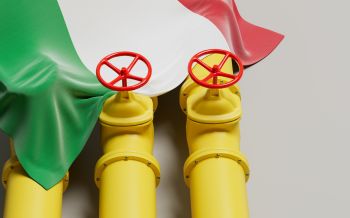The development of Greece’s natural gas sector entered a new chapter when the country’s sole LNG terminal, Revithoussa near Athens, launched a truck loading facility late last year. For Greek small-scale LNG firm Blue Grid, years of planning for the supply of LNG to off-grid customers and the road and maritime sectors – in Greece, but also the Balkans and eastern Mediterranean – can now be put into action, with the transition to renewable fuels being the ultimate goal, Alexandros Lagakos, Blue Grid’s COO, tells LNG Business Review in this exclusive interview.
Lagakos’s academic background is technical – he studied electrical engineering at Aristotle University of Thessaloniki and sustainable energy at Imperial College London – but his professional career has mostly involved commercial roles in energy trading and shipping. Companies he has worked for in the past include Mott MacDonald, Gazprom Marketing & Trading and Shell Trading. He has been part of Blue Grid since 2019, joining the Athens-based company almost a year after it was founded.
“As the COO at Blue Grid – and taking into account that small-scale LNG and the downstream supply of alternative fuels is still at its infancy in this part of the world – I’m responsible for making things happen,” says Lagakos. “As a company, we’ve pretty much carried this market on our shoulders. Firstly, we’ve designed and implemented novel supply chains around small-scale LNG for Greece and the Balkans. Secondly, we’re helping the state and authorities to close any regulatory gaps for enabling the formation of this market. And thirdly, we’re informing the industry about the merits of downstream LNG supply. Our aim is to convince them that this is a modern and futureproof solution for their business, fleet of trucks or ships.”
According to Lagakos, introducing small-scale LNG to Greece comes at a time when the country is going through its own “dash for gas” but also within an EU that has “defined its direction” when it comes to the energy transition, but hasn’t figured out yet “a way of making this happen, or whether what they’re aiming for is 100% achievable.”
While Greece is showing signs of accelerating the gasification of its economy, it is also “trying to embrace new types of fuels and energies, moving away from carbon and mineral resources,” says Lagakos. “Both are a challenge on their own.”
The type of demand Blue Grid is looking to serve in Greece – but also beyond its borders – consists of off-grid users, road transport and marine bunkering. In the case of off-grid demand, “we are helping industries, SMEs (small and medium-sized enterprises) and even city networks that don’t have access to a local pipeline network, designing and implementing virtual pipelines to provide them with the necessary molecule,” Lagakos highlights.
Small-scale LNG can be a blessing for Greece and the Balkans as it adds another energy source into the mix of these economies.
In the case of road transport, Blue Grid is developing its own network of LNG and CNG filling stations in south-eastern Europe, while its business plan for the promotion of LNG bunkering involves the acquisition of assets, both onshore and offshore, such as semi-trailers and a bunkering vessel, that will facilitate access to LNG as bunker fuel.
“The first categorisation has to do with the type of end users that we serve; the second with the type of fuels we’re active in or are developing,” Lagakos explains. “While LNG has been a very big part of our business, nowadays there’s an extra – and equal – focus on renewable fuels. For the time being, it is dominated by bio-LNG produced from waste, but we’re keeping our eyes open for other alternatives as well.”
Small-scale enabler
Thanks to Blue Grid, Greece will witness its first ever small-scale LNG supply operations this year, says Lagakos. The company’s first two industrial customers, a major papermill called El Pack and a big dairy company called Kolios, will receive their first volumes of LNG within 2023. Also within 2023, Blue Grid’s first CNG and LNG filling stations will become operational. The main enabler for this is the fact that Revithoussa, Greece’s sole, 5.1 mtpa LNG terminal, finally has its own LNG truck loading facility, inaugurated by Greek grid operator DESFA in October last year.
“Based on the initial announcements and intentions, this is something that should have happened two or three years ago, but better late than never,” says Lagakos. “Small-scale LNG volumes had made their way to the Balkans before, when extremely low TTF prices, close to EUR 6-7/MWh, made it possible to do so from western European terminals like Rotterdam despite the significant logistical costs. But because of the lack of a suitably located truck loading facility in our region, you could count these importers on one hand. Now this problem has been resolved, we are very optimistic that we can help Balkan end-users address their significant security of supply concerns. Small-scale LNG can be a blessing for Greece and the Balkans because it adds another energy source into the mix of these economies.”
According to Lagakos, the volatile price environment of the past two years, exacerbated by Russia’s invasion of Ukraine in February last year, is not putting potential customers off small-scale LNG.
“We don’t see a return to pre-war price levels as a prerequisite for enabling valuable customer propositions around small-scale LNG in our region,” he explains. “Taking into account current price levels and the current shape of the forward curve, we actually think that it makes a lot of sense to initiate small-scale LNG projects in our region. I’m saying this because, typically, a small-scale LNG project has a lead time of almost a year. If we’re talking about road transport or bunkering, not only do prices already make sense, but with LNG you’re also helping people move away from more polluting and expensive fuels, such as gasoil and diesel.”
Though Greece lags behind in terms of its gasification and moving away from petroleum products when compared to other EU nations, if a Greek company adopts LNG as fuel in heavy duty transport, “that’s already a big step forward” towards decarbonisation, sustainability and reducing emissions, says Lagakos.
“The additional benefit of switching to LNG is that without needing any incremental investment whatsoever, bio-LNG becomes a valid option whenever the customer wishes to introduce it. We’re working towards offering our customers the opportunity to run on a blend of renewable and fossil LNG and, gradually, to 100% renewable LNG. This long-term pathway LNG offers is one of the strongest parts of our pitch.”
Bunkering prospects
Lagakos acknowledges that small-scale LNG is set to remain “more of a niche” when viewed within the overall road transport sector, both in terms of its environmental and financial footprint. However, for specific segments, such as heavy-duty vehicles, “LNG is the best available option out there for cost optimisation and significant environmental upgrading,” he stresses. “In other sectors, such as private vehicles, LNG is not really going to play a leading role.”
There is interest in finding competitive LNG supplies in the East Med, including for the container and cruise shipping industries.
When it comes to LNG bunkering, “Blue Grid is not only able to supply vessels in the East Med, but also provide pan-European coverage, utilising the fact that, since 2022, it is part of Molgas Group, the largest LNG supply group in Europe today originating out of Spain,” says Lagakos.
With the truck-loading facility at Revithoussa now up and running, “our fleet of semi-trailers is able to provide LNG as a marine fuel on a truck-to-ship basis,” he adds. “So we’re not expecting any new infrastructure to happen for this market to be enabled. All we’re waiting for is for customers to appear in the East Med.”
At the same time, a big boost for LNG bunkering in Greece and the eastern Mediterranean will come in the form of the small-scale LNG jetty being developed by DESFA at Revithoussa, which is expected to come online by 2025, Lagakos adds.
“When the jetty becomes available, LNG bunkering vessels will then be able to reload there, which will increase volumes,” he says. “It’s important to note that Revithoussa has a major advantage in helping this market develop because it’s a large import terminal. This matters because bunkering volumes at Revithoussa are not reloaded LNG from another terminal but come straight from the source. We’re optimistic that this can help Blue Grid provide attractive value propositions to our customers apart from our onshore operations. We’re also developing a business plan for our own bunkering vessel.”
Lagakos notes that, for LNG bunkering to take off in the Aegean Sea and beyond, it is potential suppliers who need to reach out to customers – not the other way around. “It’s not as if the customers are out there and keep calling to ask whether you can finally serve them. It’s us who have to get out there and, in that respect, we are very active in maintaining regular communication with companies that already consume LNG and will have an interest in doing so in our region as well. We’re a member of SGMF (the Society for Gas as a Marine Fuel) and are spending a lot of time talking to other members. We understand that, yes, there is interest in finding competitive LNG supplies in the eastern Mediterranean, including for the container and cruise shipping industries.”
Reducing noise pollution
Returning on the topic of LNG as fuel in long-haul trucking, Lagakos stresses that “you don’t need incentives to actually develop it because the numbers already make sense on their own.” As far as its adoption by heavy-duty vehicle users in Greece is concerned, he expects that, as government policies start having “an ever-increasing environmental touch, this will introduce some valuable incentives for cleaner types of fuels, including LNG.”
What is still pending on behalf of the Greek government is for it to adjust road tax calculations based on the CO2 emissions of heavy duty vehicles, which has already been done for private vehicles, he adds.
Biogas production in Greece should head further down the value chain – be turned into biomethane in order to start substituting natural gas.
“The Greek heavy-duty fleet is the oldest in Europe – the average age of a typical truck is about 19 years old. We sense that there is a push for kicking Euro 2 and Euro 3 diesel trucks out of the market, which will inevitably lead to people having to replenish their fleet. They will then put the numbers down and see whether it makes more sense to buy an LNG-fuelled truck instead of Euro 6 diesel truck.”
At the same time, Blue Grid would like to see the Greek government adjusting to the common European practice of offering discounts for heavy-duty trucks that run on clean fuels at road tolls, with the average discount enjoyed by a clean truck in a typical EU country standing around 15-16%, Lagakos highlights, with Germany sitting at the extreme end of giving a full exemption since 2019, a policy that is due to end this year.
“Although we don’t see discounts at Greek road tolls coming, we’re constantly monitoring this policy and, whenever we’re given the opportunity, we pitch in favour of Greece taking this direction.”
Meanwhile, the benefits of LNG as fuel for heavy-duty vehicles are not limited to environmental ones – it reduces CO2 emissions by 20-30%, nitrogen oxides (NOx) by 85%, while sulphur oxides (SOx) – but extend to reducing noise pollution, which is critical in an urban environment, Lagakos points out.
“It is one of the greatest advantages of LNG in road transport. For example, we’ve been talking to supermarket companies who face the challenge of having to replace stock in their stores overnight and would like to do this in the least noisy way. Being able to significantly reduce the noise pollution in their operations – by about 50% less – has an additional ESG (environmental, social, and governance) value for them.”
Circular economy
Looking ahead, though Greece, as a renewable electricity-rich country in terms of resources, has potential as a producer of e-fuels derived from solar or wind, when it comes to biogas and biomethane production, it remains “in the backseat,” Lagakos says.
“We don’t have the culture to support this circular economy that results in biogas production,” he explains. “I believe we will get there, as Greeks learn to utilise waste in a more sustainable way. On that note, I think burning biogas to produce electricity is a renewable resource going to waste – generating electricity through the sun, wind and geothermal energy is much better. At Blue Grid, we strongly believe that biogas production in Greece should head further down the value chain – be upgraded, cleaned up, then turned into biomethane in order to start substituting natural gas, including in residential heating, where we have very few alternatives so far.”
By “cleaning up” the natural gas mix that runs in the Greek pipeline system, “we see a lot of space on the demand side, both on the road and sea transport sectors, and even in industrial and residential applications,” Lagakos concludes. - KT
Subscription Benefits
Our three titles – LNG Business Review, Gas Matters and Gas Matters Today – tackle the biggest questions on global developments and major industry trends through a mixture of news, profiles and analysis.
LNG Business Review
LNG Business Review seeks to discover new truths about today’s LNG industry. It strives to widen market players’ scope of reference by actively engaging with events, offering new perspectives while challenging existing ones, and never shying away from being a platform for debate.
Gas Matters
Gas Matters digs deep into the stories of today, keeping the challenges of tomorrow in its sights. Weekly features and interviews, informed by unrivalled in-house expertise, offer a fresh perspective on events as well as thoughtful, intelligent analysis that dares to challenge the status quo.
Gas Matters Today
Gas Matters Today cuts through the bluster of online news and views to offer trustworthy, informed perspectives on major events shaping the gas and LNG industries. This daily news service provides unparalleled insight by drawing on the collective knowledge of in-house reporters, specialist contributors and extensive archive to go beyond the headlines, making it essential reading for gas industry professionals.





